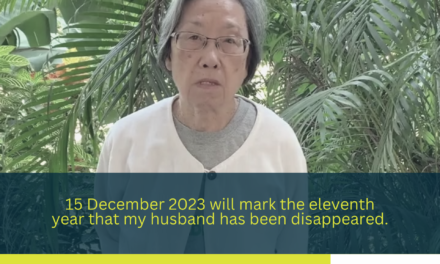On 24th April 2015 at the ASEAN Peoples Forum in Kuala Lumpur, NGOs (including Focus on the Global South), CSOs and ASEAN People organized a workshop on Enforced Disappearance in ASEAN to raise awareness of the barriers victims face in accessing justice and the mechanisms ASEAN can use to stop enforced disappearances.
Below is the statement signed by individuals and organizations and sent to ASEAN / AICHR (ASEAN Intergovenmental Commission on Human Rights), urging them to address this pressing matter and take into account the recommendations to end enforced disappearance in ASEAN.
—-
ASEAN and AICHR: End Enforced Disappearance in Southeast Asia!
ASEAN People’s Forum 2015, Kuala Lumpur, Malaysia
24 April, 2015
Enforced disappearances continue to occur unabated in most ASEAN member countries and illustrate an alarming and worrisome pattern of human rights violations that target citizens, community leaders, human rights defenders, environmental and student activists, and even children.
In all cases of enforced disappearance, government and law enforcement authorities, the military and other state agents have denied knowledge of the crime and the victims’ fate or whereabouts. Governments have failed to conduct thorough, credible, and impartial investigations into these disappearances and bring perpetrators to justice. In most cases, evidence suggests direct involvement, complicity, or acquiescence of government security forces (military, police, and other state agents) in the actual disappearance as well as covering up the crime.
The families of the victims suffer tremendous mental anguish, not knowing the conditions of their loved ones and even whether they are alive or dead. Enforced disappearance results in psychological trauma, tremendous economic and social dislocation, and fragmentation within families. It is also used as a weapon to spread fear in society and to silence those who raise questions about human rights violations. Fear and insecurity among families and acquaintances of the disappeared make it difficult to accurately document cases of enforced disappearance, as well gather crucial evidence to ensure the safe return of victims and punishment of the perpetrators.
Report of the Working Group on Enforced of Involuntary Disappearance 2014 in seven ASEAN countries:
Country: Number of Cases
- PHILIPPINES: 625
- THAILAND: 81
- INDONESIA: 163
- CAMBODIA: 1
- LAO PDR: 2
- MYANMAR: 2
- TIMOR LESTE: 428
The actual numbers of disappearances are unknown since many remain unreported by relatives and witnesses for fear of reprisal from state authorities, as well as a lack of national/international authorities to whom they can report such disappearances. A number of cases over the past ten years, however, have directed national and international attention towards enforced disappearances.
In the Philippines, a farmer and leading activist with the Alliance of Farmers in Bulacan Province, Mr. Jonas Burgos, was abducted by five unknown individuals on 28 April 2007 while having lunch alone at a restaurant inside a shopping mall. It was later determined by the Court of Appeals that the abduction of Jonas Burgos was a case of enforced disappearance. On 18 March 2013, Major Harry BaliagaJr. of the Armed Forces of the Philippines (AFP) was positively identified by a witness as one of the perpetrators. The said officer was imprisoned, but then released on bail and promoted to lieutenant colonel. On 12 April 2013, the Supreme Court ordered the Philippine army’s Chief of Staff to disclose the whereabouts of the soldiers believed involved in the disappearance of Jonas Burgos, but the Philippine army has ignored the order and no one has been held accountable for the disappearance.
In Thailand, Mr.Somchai Neelapaijit, a prominent lawyer who defended the rights of mostly ethnic Malay Muslim in southern border provinces of Thailand, was abducted by police officials on 12th March 2004 on Ramkhamhaeng Road in Bangkok. On 12January 2006, a Bangkok criminal court convicted one police officer of a minor charge of coercion and sentenced him to three years in prison, but released him on bail. On 11 March 2011, the Court of Appeals overturned the conviction of the police officer and upheld the acquittal of the other four. On 17 April 2014, Mr. Pholachi Rakchongcharoen, aka “Billy”, an activist promoting the rights to land of indigenous peoples, was arrested by the head of Kengkrachan National Park. One day later, the head of the national park confirmed that Billy had been detained for interrogation proposes and claimed that he had been released. However, no evidence has been provided confirming Billy’s release and nobody has seen him since.
In Kachin State in Northern Myanmar, Ms.Naw Sumlut Roi Ja, an ethnic Kachin resident ofMomauk Township, was abducted by the Burmese army on 28 October 2011. Numerous petitions have been filed asking authorities to disclose SumlutRoiJa’s whereabouts and fate. Both military and civilian authorities have consistently refused to investigate Sumlut Roi Ja’s disappearance and prosecute the soldiers who abducted her.
On 23 January 2007, Mr. Sompawn Khantisouk, a well-known eco-tourism business owner in Luang Nam ThaProvince in the Lao PDR, was abducted in broad daylight by people in police uniforms. To date, the Lao government has not disclosed any information about what happened to him. Mr. Sombath Somphone, an eminent Lao civil society leader and recipient of the prestigious Ramon Magsaysay Award was last seen on the evening of 15 December 2012 in Vientiane after traffic police stopped his vehicle, other persons without uniforms then drove him away in another vehicle.The events were recorded on CCTV. Despite claims that it is investigating Sombath’s disappearance, the Lao government has provided no meaningful information about the case.
Sixteen year-old Khem Sophath has been missing since 03 January 2014 when Cambodian security forces opened fire on striking garment factory workers near the Canadia Industrial Park in southwest Phnom Penh. In the crackdown, four workers were killed and 25 others suffered bullet wounds. Sophath was last seen on the morning of the events, his chest covered in blood, lying on the ground on VengSreng Road near the Canadia Industrial Park.
In Indonesia, Dedek Khairudin was taken from his home in PangkalanBrandan, North Sumatra, on 28 November 2013 by local military personnel. According to Dedek’s family, he was arrested and detained because the soldiers believed he knew of the whereabouts of a suspect who had allegedly stabbed a soldier. The following day, 29 November, Dedek’s family visited the police and the military headquarters in PangkalanBrandan to inquire about his whereabouts, but the authorities denied having him in custody.
Enforced disappearance violates numerous internationally recognized human rights and, if part of a widespread or systematic attack against any civilian population, is considered a crime against humanity.
It is regrettable and unacceptable that ASEAN member states have remained conspicuously silent with regard to enforced disappearance. Only three ASEAN governments have signed the UN Convention for the Protection of All Persons from Enforced Disappearances and only Cambodia has ratified it. The Philippines is the only ASEAN country with a domestic law criminalizing enforced disappearances. The ASEAN Intergovernmental Commission on Human Rights (AICHR) has no rules and mechanisms to receive and address complaints of enforced disappearance.
We urge ASEAN and AICHR to urgently:
- Break the silence on enforced disappearance and take immediate actions to bring the perpetrators to justice.
- Encourage all ASEAN governments to sign and ratify the International Convention on the Protection of All Persons from Enforced Disappearance; recognize the competence of the UN Committee on Enforced Disappearances, and; apply the treaty into their domestic legislation and criminalize enforced disappearance.
- Conduct serious and full investigations in to cases of enforced disappearance; hold accountable and prosecute perpetrators to the fullest extent of the law, and; provide reparations and psychosocial support to the victims’ families.
- Amend the terms of reference of AICHR to ensure that the body effectively addresses human rights violations perpetrated by law enforcement bodies and state agents, including enforced disappearances.
- Provisions to give teeth to the AICHR must include: 1) establishment of a review mechanism of the human rights performance of ASEAN member states; 2) enable AICHR to conduct country visits; and 3) allow the AICHR to receive, investigate, and address complaints of human rights violations in the ASEAN member states.
As ASEAN advances towards a common economic community, we remind the ASEAN governments and AICHR that they have obligations under international law to ensure that the human rights of all peoples in the ASEAN region are upheld and protected. Peoples in the ASEAN region should be able to look forward to a region of diverse cultures and faiths, united by peace, social-economic justice, democracy and ecological sustainability.
We ask the international community, civil society, human rights organizations and human rights defenders to support our efforts to put an end to this cruel and grave crime of impunity.
Signed by:
Organizations
1. Advocacy Forum – Nepal
2. American Friends Service Committee
3. Asian Human Rights Commission – Hong Kong
4. Asian Federation Against Involuntary Disappearance (AFAD)
5. Association of Con Dau Parishioners
6. Boat People SOS
7. Cambodia Grassroots Cross Sector Network – Cambodia
8. Cambodian Human Rights Action Committee
9. The Cambodian Human Rights and Development Association – ADHOC
10. Campaign to Abolish Torture in Vietnam
11. Coalition to Abolish Modern Day Slavery in Asia
12. Defence for Human Rights – Pakistan
13. Families of the Disappeared (FoD)
14. Finnish Asiatic Society – Finland
15. Focus on the Global South
16. The Free Jonas Burgos Movement (FJBM) – Philippines
17. Gray Panthers of Metropolitan Washington DC – United States
18. HAK Association
19. Human Rights Online Philippines – Philippines
20. Imparsial – The Indonesian Human Rights Monitor
21. International Coalition Against Enforced Disappearances (ICAED)
22. Justice for Peace Foundation – Thailand
23. JSMP – Timor-Leste
24. Karapatan Alliance for the Advancement of People’s Rights – Philippines
25. KilusanPaka Sa PambansanuDemokrasion – Philippines
26. Lilak (Purple Action for Indigenous Women’s Rights) – Philippines
27. Land Core Group – Myanmar
28. Odhikar – Bangladesh
29. People’s Watch – India
30. Philippine Rural Reconstruction Movement – Philippines
31. Rights, Inc- Philippines
32. The Sombath Initiative
33. Southern Peasant Federation – Thailand
34. Toward Ecological Recovery and Regional Alliance
35. Vietnam Committee on Human Rights
36. Vietnamese Women for Human Rights – Vietnam.
37. Worker’s Information Center – Cambodia
38. Women Peace Network Arakan and Justice for Women – Myanmar
39. Yayasan LINTAS NUSA Batam – Indonesia
Individuals
40. Vo Van Ai,President, Vietnam Committee on Human Rights – Vietnam
41. Dr. Keith Barney, Lecturer, The Australian National University – Australia
42. VachararutaiBoontinand– Thailand
43. K.J. Brito Fernando, President of Families of the Disappeared
44. Anne-Sophie Gindroz
45. William Nicholas Gomes, Human Rights Defender and Freelance Journalist – United Kingdom
46. Victoria Goh, former UNODC staff – Singapore
47. Edeliza P Hermandez, Executive Director of the Medical Action Group – Philippines
48. Philip Hirsch, Director of Mekong Research Group
49. PoengkyIndarti, Executive Director of Imparsial – Indonesia
50. PanjitKaewsawang, Feminist Activist – Thailand
51. NaparatKranrattanasuit, Lecturer and researcher at Human Right and Peace Studies, Mahidol University – Thailand
52. Margie Law, Mekong Monitor, Tasmania, Australia
53. Max M.de Mesa, Chairperson, Philippine Alliance of Human Rights Advocates – Philippines
54. Mugiyanto, Chair of the Board of Indonesian Association of Families of the Disappeared (IKOHI) – Indonesia
55. PadtheeraNarkurairattana- Thailand
56. Shuimeng Ng, wife of Mr. SombathSomphone – Singapore
57. SiaPhearum, Executive Director of the Housing Rights Task Force– Cambodia
58. Sor.RattanamaneePolkla, Human Rights Lawyer – Thailand
59. BanpotThontiravong, PhD. Institute of Human Right and Peace Studies, Mahidol University – Thailand
60. Huynh ThucVy –Vietnam
61. YuyunWahyuningrum, Senior Advisor on ASEAN and Human Rights, Human Rights Working Group (HRWG) – Indonesia
62. SuphatmetYunyasit, Institute of Human Right and Peace Studies, Mahidol University – Thailand








